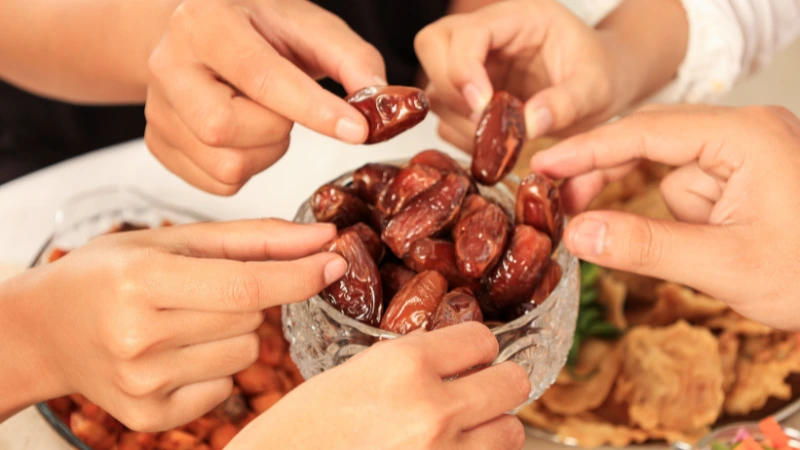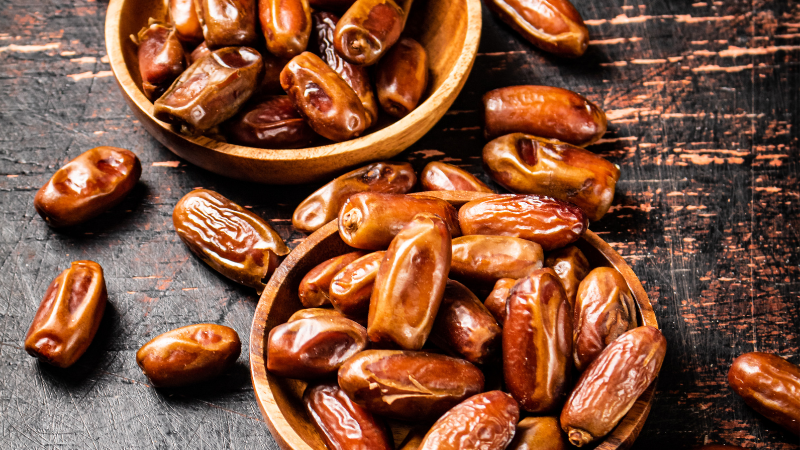How Much Protein In One Date?
Dates are the one fruit that, despite being loaded with sugar, is a nutritional powerhouse! In this article, you will find out the nutritional facts and benefits of dates and get the answer to the question, “How Much Protein In One Date?” So without further ado, let’s get started!
The question is, among other nutrients, are dates a good source of protein? The tiny date fruit cannot be underestimated, from boosting brain health and giving you youthful skin to helping with childbirth it is capable of many wonders!
Do Dates Have Protein?
From fats and carbs to vitamins and minerals, there is no shortage of nutrition in the small body of a date. While dates also contain protein, it is found in minimal quantities only. One date (about 8 grams) contains about 0.2 to 0.6 grams of protein.
Now that you’ve understood how much protein in one date. However, dates cannot be considered the best source of protein. You must pair them with other protein sources to meet your daily requirements.
The protein content of a date might also depend on the type of date you consider. For example, one type of date called Medjool has a relatively high protein content per serving.

Dates Nutrition Facts
Dates are a nutrient-dense fruit, providing a variety of essential macronutrients and micronutrients. Below is a detailed table summarizing the approximate content of key macronutrients, vitamins, and minerals in 100 grams of dates:
| Nutrient | Amount per 100g |
|---|---|
| Macronutrients | |
| Energy | 277 kcal |
| Carbohydrates | 75 g |
| – Sugars | 63 g |
| – Dietary Fiber | 8 g |
| Protein | 2-2.5 g |
| Fat | 0.4 g |
| Vitamins | |
| Vitamin B6 | 0.2 mg |
| Folate (Vitamin B9) | 15 µg |
| Vitamin A | 149 IU |
| Vitamin K | 2.7 µg |
| Minerals | |
| Potassium | 656 mg |
| Magnesium | 54 mg |
| Iron | 0.9 mg |
| Calcium | 39 mg |
| Phosphorus | 62 mg |
| Copper | 0.3 mg |
| Manganese | 0.3 mg |
So what if a date’s protein content is a little low? The fruit compensates for it by packing a powerful punch of other essential nutrients and minerals for the body! Here is a breakdown of the nutritional value that a provides to the human body.
Carbohydrate Content in Dates
A single date has about 6 grams of carbohydrates much of which comes from the sugar content. The high fructose content of a date is what also makes it so sweet. As the date ripens with time, its sugar content increases, and the fiber content decreases.
Fats Content in Dates
Dates have little to no fat content! The most amount of fat you may find in a single date will be about 0.03 grams. If you consider the calorie breakdown for a date, a single date contains 23 calories. Of these calories, 96% are carbs, 3% are protein, and 1% is fat.
Vitamins and Minerals Content in Dates
Potassium, Iron, Magnesium, 6 important B vitamins, folate, etc. You name it and dates have got that vitamin and/ or mineral to keep you healthy!
Dates are also rich in polyphenols. Polyphenols are a type of antioxidant that protects the body against cellular damage.
Fiber Content in Dates
Dates are often known for making you feel full. This is because these nutritious fruits are packed with 7 grams of fiber per serving. This is equivalent to the amount of fiber in a cup of whole wheat cooked pasta or half a cup of lentils.
How Much Protein Is There In Dates Per 100 Grams?

Since you know how much protein in one date, you can calculate the amount of protein content per 100 grams of dates by adding the protein content. However, this can differ based on the type of date being considered.
For example, in 100 grams (or 4 dates) of Deglet Noor, a type of date, there is 2.5 grams of protein. In another type of date called Medjool, 100 grams would contain 1.8 to 2 grams of protein.
The perfect amount of dates and their nutrients or calorie intake should be monitored under the guidance of your nearest nutritionist.
Following are some of the most common types of dates, and the protein content varies slightly between different varieties.
| Date Variety | Protein per 100g |
|---|---|
| Medjool | 1.8 g |
| Deglet Noor | 2.5 g |
| Barhi | 1.2 – 1.5 g |
| Zahidi | 1.5 g |
| Halawi | 1.2 – 1.5 g |
| Khudri | 1.5 g |
| Mazafati | 1.8 – 2.0 g |
| Ajwa | 1.5 g |
| Sukkary | 1.2 – 1.5 g |
| Dayri | 1.5 g |
| Thoory | 1.5 g |
| Safawi | 1.5 g |
| Khadrawy | 1.5 g |
